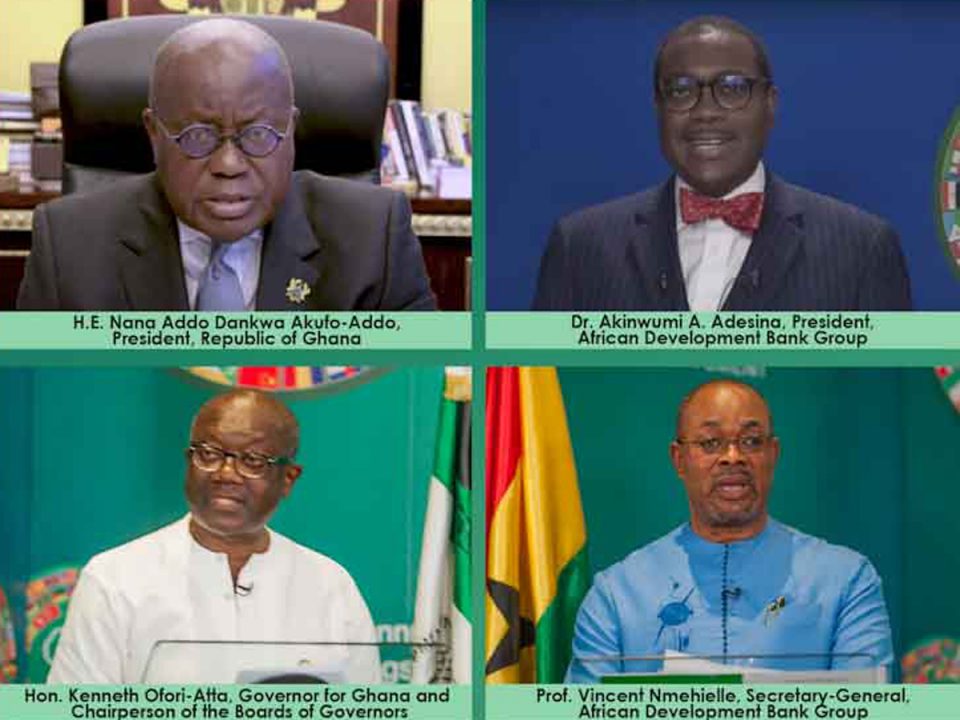Prominent African leaders, yesterday, took turns to examine the continent’s development agenda, admitting the future is in danger if it does not take its affairs into its hand and chart a new course.
The leaders include President of Ghana, Nana Akufo-Addo; his Tanzania and Mozambique counterparts, Samia Hassan and Filipe Nyusi; Prime Minister of Rwanda, Edouard Ngirente; President of the African Development Bank (AfDB) Group, Dr. Akinwumi Adesina; Chairperson of the African Union Commission, Moussa Faki Mahamat and Chairmanship of the Board of Governors of AfDB/Ghana’s Minister of Finance, Kenneth Afori-Atta.
They warned that there is no better time to take proactive actions and secure long-desired economic freedom, noting that Africans could only turn to western countries for support at their own peril.
They spoke at the opening ceremony of AfDB’s Annual General Meeting (AGM) held in Accra, Ghana, with a focus on the most troubling challenges facing Africa: climate change adaptation, just energy transition and food crisis.
After the opening ceremony, the leaders dissolved into a presidential dialogue where they debated extensively on the overwhelming challenges facing the continent: rising sovereign debts, narrowing financing options, energy shortage, low infrastructure, climate change vulnerability and food crisis.
They also reviewed prospects, while suggesting call-to-actions that must be implemented if Africa will rise to the occasion.
Akufo-Addo, the chief host of the AGM, sought the collaboration of African leaders to expand the role of AfDB in the development agenda of the continent and warned that the skewed global financial system cannot support its aspiration for economic emancipation.
The Ghanaian leader, who described the works of AfDB as “nothing short of exemplary”, spoke about rising sovereign debt (which he said is compounding the woes of national governments), imbalance in global climate change financing, structural challenges as well as the unaffordable cost of borrowing, and warned that Africa has a rare chance to leverage its enormous internal capacity to save its citizens or be doomed forever.
Churning out statistics that underpin Africa’s heightening vulnerability in the changing world, he said: “The immediate economic consequences – whether in the form of rising inflation, lower growth, increased inequality, and greater financial instability – are likely to permeate deeper, as they coincide with weakened economic positions due to the pandemic and pre-existing and now elevated debt challenges.
“The debt challenges are compounding for us in Africa. In pursuit of policy autonomy in the ‘Age of Choice’ for economic transformation, our debt profile has changed markedly. According to United Nations Economic Commission for Africa (UNECA), the debt to GDP ratio rose from 60 per cent to an estimated 71.1 per cent between 2019 and 2020, largely because of the COVID-19 pandemic.
“Eighteen African economies have faced credit downgrades, even when all economies were suffering fallouts from the pandemic last year. Amid these challenges, we must be aware of our vulnerability to the monetary policy stance of the US Federal Reserve, and the risk of so-called ‘taper-tantrums’, as investors may exit our markets, further exacerbating the increasing cost of borrowing.”
The way forward, he said, is for the continent to strategically expand the role of AfDB in the regional developmental agenda such that “we can move from the corridor of billions of dollars to trillions of dollars”.
Adesina declared he “does not have a job” as president of the regional bank but is on a “mission” to make Africa great again.
“My life is only useful to the extent it is used to improve the lives of Africans,” the former Nigerian agriculture minister told excited African leaders and members of AfDB who had described him as an “African development evangelist”.
The AfDB boss said a key strategy to bridge the financing gap is leveraging the SDR and other resources to deliver the development Africa needs to regain its dignity, warning: “there is no dignity in begging for food”.
He reiterated what has become his mantra that “Africa does not need bowls on its hands but seeds in the fields” to emerge as a self-sustaining continent and a solution to the global food crisis.
He came hard on naysayers and misrepresentation of Africa’s story, insisting that misinformation about the region cannot continue to be “legitimised by economists”.
He stressed: “A climate-resilient Africa, an Africa with energy security for all; an Africa that feeds itself and becomes a solution to global food crises and an economically resilient Africa” is achievable.




